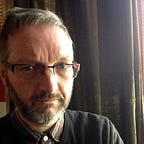‘Faith, Hope and Carnage’
Nick Cave inspiring this thought for BBC Radio 4 on ritual and spirituality in the circular economy of faith.
What’s the most spiritual book published in 2022?
There’s a good argument for saying it’s a series of conversations about life and death, art and creativity between the journalist Sean O’Hagan and the rock singer Nick Cave.
Entitled ‘Faith Hope and Carnage’, Rowan Williams — who knows about these things having once been Archbishop of Canterbury — says he can’t recall reading ‘so searching an engagement with how faith works…’
Cave told BBC Newsnight that it was the sudden death of his teenage son Arthur — and his family’s experience of grief — that transformed his perspective on life. Perhaps most surprisingly it returned him to religious practice.
Previously he considers he had a narrow view of the world but now feels as if he has become ‘an actual person’, a deep faith awakened within.
But he doesn’t buy the popular idea that spirituality is gradually displacing religion. He describes religion as ‘spirituality with rigour’ because ‘it requires something of us…’
It’s a common trope to set up religion and spirituality in opposition — the one cold and fossilised, the other cool and hip — but the American scholar Barbara Brown Taylor captures their entanglement.
‘Religion,’ she writes, ‘Is the deep well that connects me to the wisdom of the ages. Spirituality is the daily experience of hauling up living water and carrying it into a dry world.’
Asked what his religion looks like, Cave lists a series of adopted habits like attending church, praying, and reading the scriptures.
In the great communities of faith habits are often called rituals and they conjure up an alternative time and space in the day — or chart an alternative calendar through the year.
Today is the last day of the Christian year and tomorrow, the first Sunday of a season known as Advent — four weeks of waiting and deliberation, ahead of the season of Christmas.
The economy of faith is circular, a reminder that life itself is not as linear as it pretends. That every end can hold another beginning. That there is faith and hope even in carnage.
Maybe the songwriter in Nick Cave is discovering what Rabbi Chaim Stern meant when he described ritual as ‘poetry in action.’
Some days the power of taking part in the regular communal life of a church, synagogue or mosque is less in the belief system and more in the rotation of familiar habits, the pattern of rhyme and ritual, the circle of song and silence.
No one says it better than the author Karen Armstrong:
‘Religion is not about accepting 20 impossible propositions before breakfast, but about doing things that change you. It is a moral aesthetic, an ethical alchemy. If you behave in a certain way, you will be transformed.’
